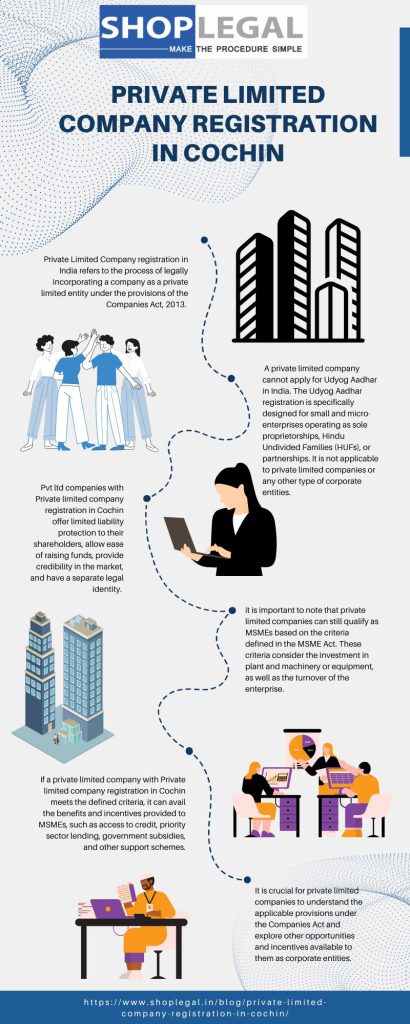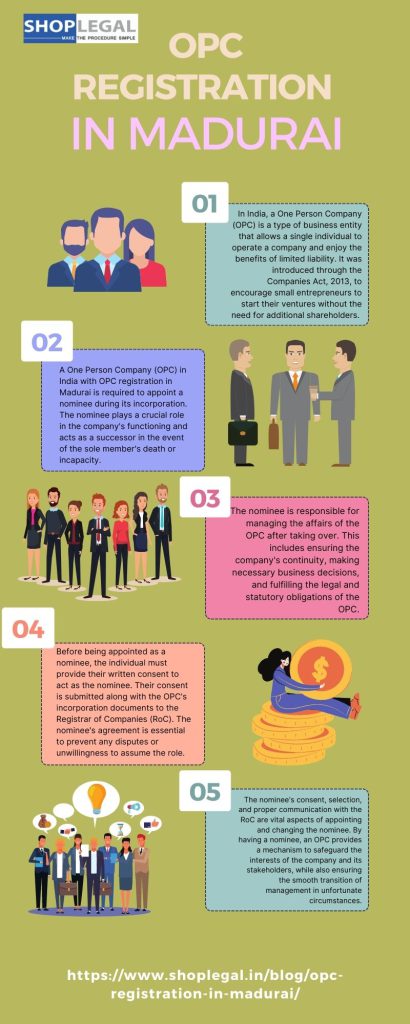Private limited company registration in Cochin
TALK TO EXPERTS
Private Limited Company registration in Cochin, India refers to the process of legally incorporating a company as a private limited entity under the provisions of the Companies Act, 2013. A private limited company is a popular choice for entrepreneurs and businesses due to its benefits, including limited liability protection, separate legal identity, and ease of raising funds.
Here’s a detailed explanation of private limited company registration in India:
Minimum Requirements:
To have Private limited company registration in Cochin, certain minimum requirements must be met:
- Directors:
A minimum of two directors are required, with at least one of them being an Indian resident. The directors must have Director Identification Numbers (DINs) issued by the Ministry of Corporate Affairs (MCA).
- Shareholders:
A private limited company must have a minimum of two shareholders. The shareholders can also be the directors of the company.
- Share Capital:
There is no minimum capital requirement for a private limited company. The company can have Private limited company registration in Cochin with a nominal share capital as per the requirements of the business.
- Registered Office:
The company must have a registered office address in India where official communications can be sent.
Name Reservation:
The first step in the registration process is to select a unique name for the company. The proposed name should comply with the naming guidelines prescribed by the MCA. Once a suitable name is chosen, an application for name reservation is filed with the Registrar of Companies (RoC) along with the required fee.
Obtaining Digital Signatures:
Digital signatures are required for the directors and shareholders of the company to sign the electronic documents during the process of Private limited company registration in Cochin. Each person involved must obtain their own Digital Signature Certificate (DSC) from authorized agencies.
Preparation of Incorporation Documents:
The next step is to prepare the necessary documents for Private limited company registration in Cochin, including:
- Memorandum of Association (MoA):
It contains the fundamental clauses defining the company’s objectives, capital structure, and the relationship with shareholders.
- Articles of Association (AoA):
It outlines the company’s internal rules, regulations, and governance structure.
- Declaration by Directors:
The directors must provide declarations stating their eligibility, non-disqualification, and compliance with the requirements of the Companies Act.
- Consent to Act as Director:
Each director must give their consent to act as a director of the company.
Filing Incorporation Application:
Once the necessary documents are prepared, an application for Private limited company registration in Cochin is filed with the RoC. The application includes the Memorandum of Association, Articles of Association, and other required documents.
Obtaining Certificate of Incorporation:
Upon submission of the application, the RoC reviews the documents and, if found in compliance, issues a Certificate of Incorporation. This certificate serves as proof of the company’s existence and includes the company identification number (CIN) and date of incorporation.
Can a private limited company apply for Udyog Aadhar?
No, a private limited company cannot apply for Udyog Aadhar in India. The Udyog Aadhar registration is specifically designed for small and micro-enterprises operating as sole proprietorships, Hindu Undivided Families (HUFs), or partnerships. It is not applicable to private limited companies or any other type of corporate entities.
Here are some key points to understand why private limited companies are not eligible for Udyog Aadhar:

Nature of Udyog Aadhar:
Udyog Aadhar is a registration provided under the Micro, Small, and Medium Enterprises Development (MSMED) Act, 2006. It is aimed at promoting and supporting the growth of micro, small, and medium-sized enterprises (MSMEs) in India. The Private limited company registration in Cochin provides various benefits and incentives to these enterprises.
MSME Definition:
The Udyog Aadhar registration is available for enterprises that fall under the definition of micro, small, and medium enterprises as per the MSME Act. The definition is based on the investment in plant and machinery or equipment and turnover of the enterprise.
Limited Liability:
Pvt ltd companies with Private limited company registration in Cochin, on the other hand, are separate legal entities distinct from their owners. They have limited liability protection, and their registration and compliance requirements are governed by the Companies Act, 2013.
The nature and structure of private limited companies do not align with the purpose and criteria of Udyog Aadhar.
Corporate Entity:
A private limited company is a type of corporate entity that requires registration with the Ministry of Corporate Affairs (MCA) under the Companies Act. It has its own legal identity, separate from its directors and shareholders. Therefore, it does not fall within the purview of Udyog Aadhar, which is specifically designed for individual proprietors, partnerships, and HUFs.
Unique Registration Processes:
Private limited companies follow a different process on Private limited company registration in Cochin than that of Udyog Aadhar. They are required to register with the MCA, obtain a Certificate of Incorporation, and comply with the applicable provisions of the Companies Act.
Benefits for Private Limited Companies:
Although private limited companies cannot avail Udyog Aadhar, they have their own set of advantages and benefits.
Pvt ltd companies with Private limited company registration in Cochin offer limited liability protection to their shareholders, allow ease of raising funds, provide credibility in the market.
They can also benefit from various government schemes and incentives targeted specifically towards companies.
However, it is important to note that private limited companies can still qualify as MSMEs based on the criteria defined in the MSME Act. These criteria consider the investment in plant and machinery or equipment, as well as the turnover of the enterprise.
If a private limited company with Private limited company registration in Cochin meets the defined criteria, it can avail the benefits and incentives provided to MSMEs, such as access to credit, priority sector lending, government subsidies, and other support schemes.
Thus, while private limited companies cannot apply for Udyog Aadhar, they can still be classified as MSMEs if they meet the criteria defined in the MSME Act.
It is crucial for private limited companies to understand the applicable provisions under the Companies Act and explore other opportunities and incentives available to them as corporate entities.
Features of Private limited company
A private limited company is a popular choice of business structure for entrepreneurs and small to medium-sized enterprises (SMEs) in many countries, including India.
This type of company offers several benefits that make it an attractive option. Here are some key benefits of a private limited company:
Separate Legal Entity:
A private limited company with Private limited company registration in Cochin is a separate legal entity, distinct from its shareholders. It has its own rights and obligations and can enter into contracts, own assets, and sue or be sued in its own name.
This separation of the company’s legal identity from its owners provides credibility, stability, and continuity to the business.
Ease of Raising Capital:
Private limited companies have various options for raising capital. They can issue shares to investors and raise funds from shareholders, venture capitalists, angel investors, or private equity firms.
The ability to attract investments and issue equity shares makes it easier to raise capital for business expansion, research and development, and other growth initiatives.
Conclusion
Thus, Private limited company is often assumed as the best choice for entrepreneurs. We Shoplegal are involved in Company registration services, GST, IT and other account related services. We do the registration services at a considerable cost.










